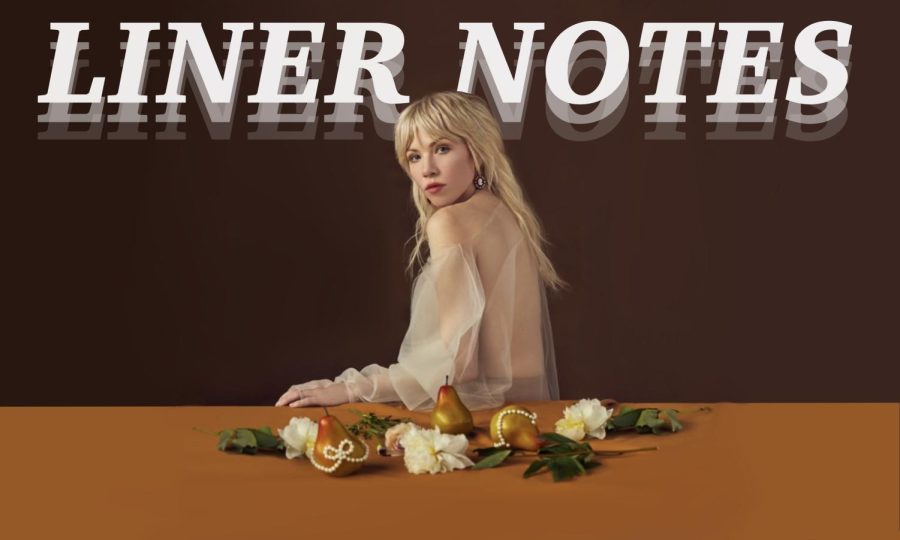Liner Notes: Carly Rae Jepsen takes listeners to the moon with “The Loneliest Time”
Carly Rae Jepsen’s “The Loneliest Time” was released Oct. 21.
November 6, 2022
On Oct. 21, millions of people across the world hit play on the latest Taylor Swift album as the clock struck midnight. But I was on a different mission that evening. As some of my best friends listened to the first notes of Swift’s “Lavender Haze,” I was beginning my most anticipated listen of the year — Carly Rae Jepsen’s “The Loneliest Time.” (For concerned Swifties, don’t worry. I did go back and listen to her album as well.)
You may recognize Jepsen’s name from her 2011 smash hit, “Call Me Maybe,” or her 2015 return to pop, “I Really Like You,” whose music video featured Tom Hanks and Justin Bieber. But just weeks ago, she dropped her fifth studio album (or seventh, if you count the two collections of b-sides she’s released).
Weaving together folk and disco influences for a wide-ranging tracklist, the project is on par with Jepsen’s previous efforts, transporting listeners with each song’s atmosphere. (The title track even promises a trip to the moon.) Since 2015’s “E•mo•tion,” Jepsen has consistently produced solid pop records, each generating their own takes on love, loss and intimacy. She’s also toyed more with self-reflection in each project — and she takes that idea even further with this latest record.
“The Loneliest Time” has something for everyone, ranging from the emotionally devastating ballad (and album highlight) in “Go Find Yourself or Whatever” to the enticingly precise autotune of the upbeat “Shooting Star.” I knew going into my first listen that I would be listening to a diverse portfolio of sounds, after each of Jepsen’s four promotional singles for the album took a totally different direction. Still, she managed to catch me by surprise.
A number of songs on “The Loneliest Time” are post-breakup mantras, detailing the different stages of grief, recovery and self-discovery that come with the end of a relationship. While she’s explored the theme in previous records, it’s much more pronounced in Jepsen’s latest effort.
Jepsen has spoken at length about the experience of dating in her 30s during performances and the press rollout for “The Loneliest Time,” but this album succinctly distills years of emotions and experiences into bite-sized capsules for listeners. (Even if she sometimes leans a little too far into the bit for my personal taste. “Beach House,” I’m looking at you.)
Throughout the album, Jepsen also explores the idea that a relationship’s end isn’t always linear. With an intriguing amount of candor, she talks about returning to an ex, even though it might not be the right choice. We’ve all either had a friend who’s done that, or been that friend ourselves. As a result, the juxtaposition between this messaging and bitingly snarky tracks like “Talking to Yourself” — a rundown of all the things Jepsen wished she’d said to an ex and my personal favorite from the album — truly highlights the complexity of modern-day romance.
As Jepsen has grown as an artist, her albums have continued to mature, and “The Loneliest Time” is a salient example of this trend. Though some of the highest highs of past albums might eclipse the peaks of Jepsen’s latest project, the project has the most consistency of any of her albums. The album clocks in at 13 songs (and three bonus tracks), yet none stand out as filler tracks. Even my least favorite tracks make sense in the narrative arc of the project, which indicates its potential staying power in my music rotation.
In recent weeks, a clip from the album’s titular track has gone viral on TikTok, where Jepsen croons a promise to return to a former lover. “I’m coming back for you, baby!” she enthusiastically exclaims. Much as she vows to come back for her lover — as she now circles back to the virality that started her career — I know I’ll find myself coming back to this record for years to come.
Email: [email protected]
Twitter: @jacobnfulton
Related stories:
— Liner Notes: Taylor Swift meets us at midnight with “Midnights”
— Liner Notes: Arctic Monkeys don’t seem to care about the recession with “The Car”
— Liner Notes: On “Laurel Hell,” Mitski gets existential about her relationship with music


